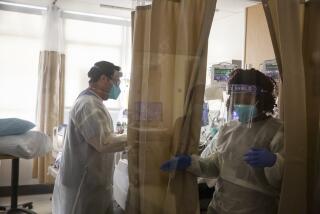Training Rxzzzzz
- Share via
The Accreditation Council for Graduate Medical Education, which oversees doctor training throughout the United States, is imposing a new set of rules that will limit the hours that medical residents can work. Beginning July 1, 2003, the maximum workweek will be 80 hours, with no more than 24 hours worked consecutively. These limits, if followed, could irrevocably change the system for training doctors, and not entirely for the better.
The age-old caste system for residency training is based on role modeling and continuity of patient care, where fledgling interns learn responsibility by doing the rounds with their supervising residents and following through with their patients.
It is incorrect to assume that sleep deprivation alone is what can lead to untoward patient outcomes. The greater risks lie with poorly motivated residents who lack adequate guidance.
In fact, one could easily argue that “shift mentality,” wherein an intern or resident is quick to go home and leave behind a deteriorating patient, leads to worse outcomes than fatigue.
In part it is the sleepless nights that form a doctor’s mettle. Essential skills learned under military-type rigor are not soon forgotten and are essential to good doctoring. And many specialties require emergency middle-of-the-night calls throughout a doctor’s career--it is the on-call shift that prepares a young doctor for the later demands of practice.
But residents should not be deprived of sleep or kept from going home in order to perform menial clerical and administrative tasks on behalf of the hospital. The reason for staying must be strictly medical.
Unfortunately, bleary-eyed residents are often stuck with administrative duties that include piles of paperwork. It is not good for the morale of these new doctors to see nurses and aides going home while the doctors stay behind to fill out forms.
It is not right for hospitals to use doctors-in-training as slaves. Residency is an apprenticeship, a complex combination of learning and simultaneous practitioning. Doctors, molting into practitioners, are being prepared for future crises that they will have to manage alone. Just last month in the intensive care unit at my hospital, a patient was brought back from a middle-of-the-night cardiac arrest and apparent stroke by the one resident who knew her case well.
A greater concern than hours is supervision. Eighteen years ago in New York a young woman named Libby Zion was diagnosed and treated improperly because of inadequately supervised--not sleep-deprived--residents. She died. The result of this case was New York’s laws to limit residency hours, yet adequate supervision, the real problem, was not ensured. This year, an undertrained doctor at a New York teaching hospital was left in charge of a ward of sick liver transplant donors and recipients, and a liver donor died.
Unfortunately, the accreditation council is too heavily represented by hospitals to consider a more important step--hiring more residents. That step would be expensive, and hospitals are already feeling the pressure of decreasing reimbursements and lengths of stay. But without more doctors, patients are sure to suffer. If residents now must go home early, who will stay behind to replace them?
Overtired residents may one day not be able to keep up with the ever-deepening pool of technical medical knowledge. For now, however, no matter how many or how few hours they work, or how early or how late they go home, insufficient supervision remains the greater problem.
More to Read
Sign up for Essential California
The most important California stories and recommendations in your inbox every morning.
You may occasionally receive promotional content from the Los Angeles Times.













